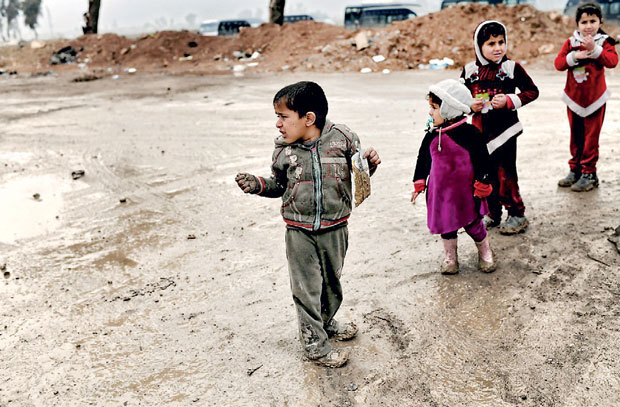29 Mar 2017 - {{hitsCtrl.values.hits}}

(c) 2017, The Washington Post ·
Until now there has been a stark contrast between the tactics of the U.S.-backed military campaign to recapture Mosul, Iraq, from the Islamic State and those of Russian and Syrian government forces attacking rebels in neighboring Syria. The latter has featured deliberate bombing of civilian targets, including hospitals, food stores and aid convoys, at the cost of thousands of lives.
In Mosul, meanwhile, Iraqi counterterrorism forces have sustained heavy casualties in street fighting while limiting the use of artillery and airstrikes to avoid civilian deaths, winning praise from humanitarian groups.
A U.S. airstrike that may have killed scores or even hundreds of people in Mosul on March 17 may now tarnish that record. Iraqi civil defence officials are saying the attack targeted a building in Mosul’s al-Jadida neighbourhood where many people were crowded in a basement; the remains of more than 100 had been recovered by Sunday. On Saturday, the Pentagon confirmed that the coalition had targeted Islamic State fighters “at the location corresponding to the allegations of civilian casualties” and said a formal inquiry was underway.
Confusion still surrounds the incident: Iraqi military authorities are saying the casualties were caused by booby traps the Islamic State had planted in the house, or by a suicide car bomb that detonated nearby. There’s no question that the jihadists are using civilians as shields, forcing them to stay in homes that are used as firing positions. It is nevertheless vital that U.S. authorities determine as quickly as possible whether an American or coalition bomb caused the civilian deaths, and, if so, accept responsibility.
It’s equally important that U.S. and Iraqi forces minimize further civilian casualties as they reclaim the remaining, densely populated areas of Mosul still held by the Islamic State. Once the fight is over, the Shiite-led Iraqi government will face the stiff political challenge of stabilizing a multiethnic city that includes hundreds of thousands of Sunnis; that will be all the more difficult if the pro-government forces have inflicted heavy casualties.
U.S. commanders appear to understand the stakes. Gen. Joseph Votel, leader of U.S. Central Command,issued a statement saying”the death of innocent civilians in Mosul is a terrible tragedy” and that the coalition “will continue to take extraordinary measures to avoid harming civilians.” U.S. spokesmen say the rules of engagement governing airstrikes, which are tailored to avoid civilian deaths, have not changed.
Outside observers nevertheless are speculating that the advent of the Trump administration has loosened restraints on U.S. attacks in the Middle East. A controversial Jan. 29 raid in Yemen, approved by President Donald Trump, killed up to a dozen civilians, according to Votel. A U.S. airstrike in Syria’s Aleppo province on March 16 is under investigation amid allegations that it killed scores of civilians gathered in a mosque; the Pentagon described the target as an al-Qaeda gathering.
President Barack Obama was frequently criticized, with some reason, for micromanaging military strike decisions and exercising excessive caution. Trump, on the other hand, has talked loosely about heavily bombing Islamic State-held areas and has stepped up direct U.S. involvement in the fighting. Defeating the Islamic State more quickly through the greater use of U.S. force is a worthy goal. But doing so at the cost of higher civilian casualties would be a serious mistake.
17 Nov 2024 1 hours ago
17 Nov 2024 2 hours ago
17 Nov 2024 5 hours ago
17 Nov 2024 5 hours ago
17 Nov 2024 5 hours ago